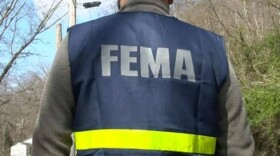ARI SHAPIRO, HOST:
After the fall of the Assad regime in Syria, the family's properties were left abandoned. One of those was the Assad family's summer home, with a private beach on the Mediterranean. It's just outside the coastal city of Latakia. NPR's Hadeel Al-Shalchi visited the resort, which was once off-limits.
HADEEL AL-SHALCHI, BYLINE: We drive through the grounds of the Assad family's summer home. It's surrounded with olive groves and lush orange trees. But I also see something unexpected.
(SOUNDBITE OF CAR DOOR SHUTTING)
AL-SHALCHI: And we just stopped to talk to some people - you know, dozens of people with pickup trucks and bicycles and motorcycles are collecting wood.
HANAN SARY: (Non-English language spoken).
AL-SHALCHI: One of them is Hanan Sary. She hauls piles of dried branches onto the back of a red pickup truck. She says her village never had the right kind of wood to burn in the stoves to keep warm. Sary says the wood here is perfect.
SARY: (Non-English language spoken).
AL-SHALCHI: "See our land with all these olives? We could never enter it before, but now we're here," Sary says.
A few minutes' drive away is the gate of the summer villa. A large group of armed guards sit drinking tea and letting cars in.
UNIDENTIFIED GUARD: (Non-English language spoken).
AL-SHALCHI: One of the guards escorts us up to the villa. And what a sight it is - a massive, modern, white building surrounded by gardens, cacti, palm trees and all kinds of flowers. Inside, a breeze sweeps through the wide rooms.
I'm walking through this sprawling, empty villa. It's overlooking the Mediterranean. It's - but it's absolutely empty. You can hear my voice in some areas echoing, and that's because it has been completely looted. You can see where televisions usually were on the walls. Their wires are just pulled out. There's glass all over the ground. Light fixtures are - obviously have been pulled out of the ceiling. And then there's black graffiti all over the walls, cursing Bashar al-Assad.
Syrian friends and family are touring the home. It feels like we're visiting a museum. Twenty-five-year-old Mohamed Ismail is posing for a photo on one of the multiple balconies. He's both enthralled by the house but also bitter.
MOHAMED ISMAIL: (Non-English language spoken).
AL-SHALCHI: "He kept his people living in poverty while he lived in a palace with a million rooms," Ismail says about the former president.
(SOUNDBITE OF FOOTSTEPS)
AL-SHALCHI: Going up the stairs back to the main floor.
And there's a large primary bathroom with a huge window, a bubble bath with a sunset view. The toilet, shower and mirror are all smashed in.
Outside is this beautiful area with a pizza oven and a bar. You know, you could totally tell parties may have been thrown here. There's even a row of showers just outside of where the swimming pool is.
This was home to one of the most secretive dictators in the world, and now Syrians who were terrified to say anything about him are wandering around his living room.
Hadeel Al-Shalchi, NPR News, Latakia. Transcript provided by NPR, Copyright NPR.
NPR transcripts are created on a rush deadline by an NPR contractor. This text may not be in its final form and may be updated or revised in the future. Accuracy and availability may vary. The authoritative record of NPR’s programming is the audio record.








